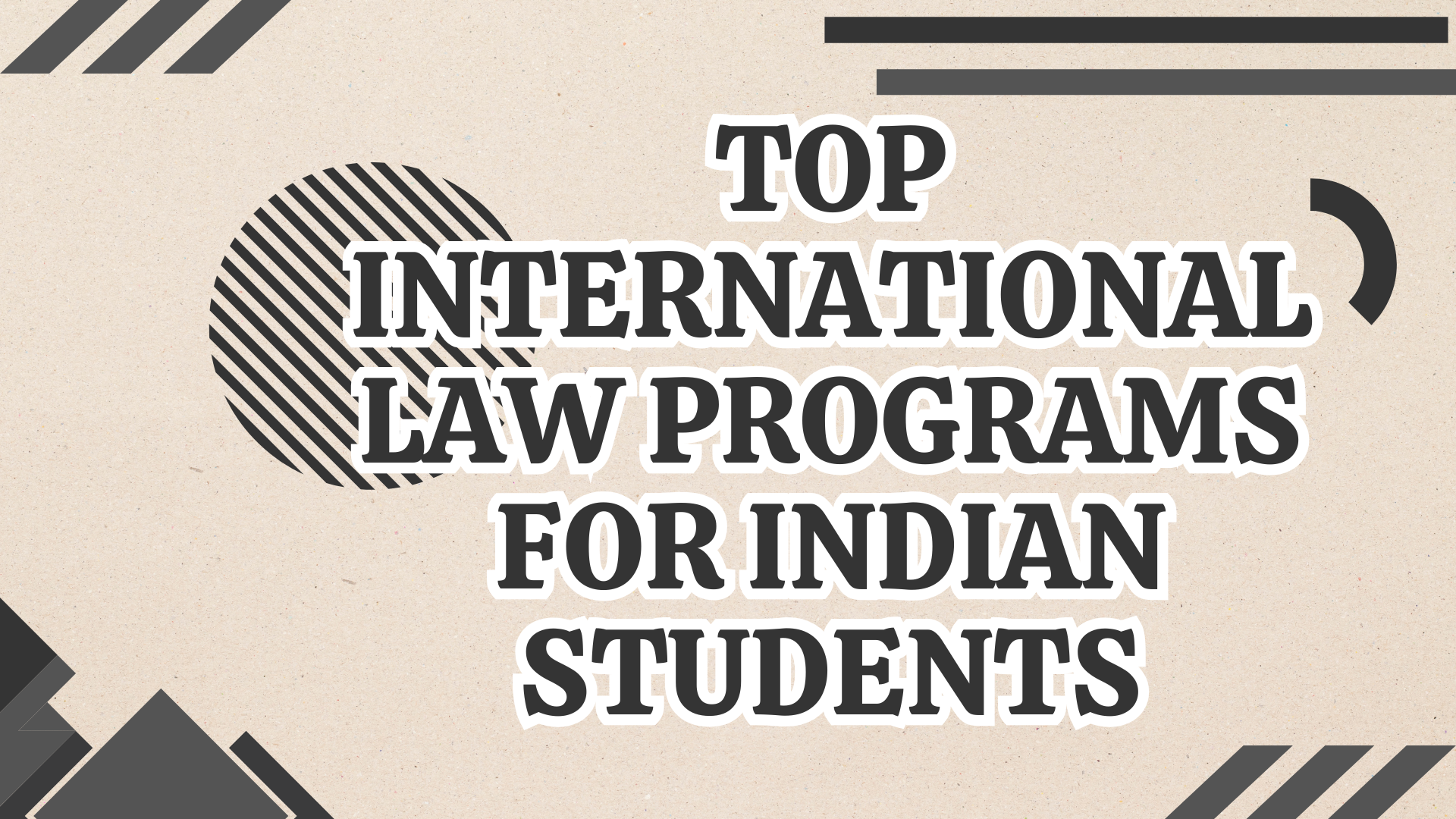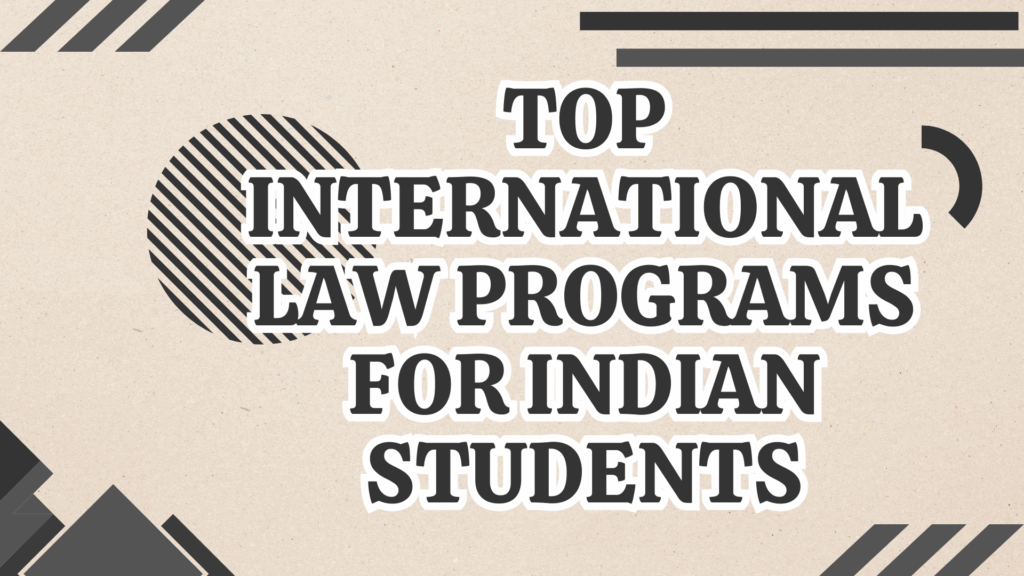In this post, we will learn about some of the Top International Law Programs for Indian Students in 2025; get informed and choose the right option for you.
Top International Law Programs for Indian Students in 2025
In 2025, more and more Indian students who want to work in law throughout the world are choosing to have an international law degree. Many Indian students are looking at law schools overseas to get a competitive advantage, exposure to other countries, and credentials that are recognized throughout the world. This is because there are more and more jobs in international trade law, human rights law, environmental law, and arbitration.
This article looks at the best international law programs for Indian students in 2025, including the best schools, who can apply, how much they cost, what they teach, and how well-known they are. We also give you a useful table to help you compare quickly.
Why Study Law Abroad?
There are several benefits to studying law in other countries:

- Getting to know other legal systems
- Internships and networking opportunities throughout the world
- Access to well-known legal firms, international groups, and enterprises that do business in more than one country
- Acknowledgment in scholarly and policy-making domains
- Possible approaches to get dual qualifications and work as a lawyer in another country
Indian students often choose LLM (Master of Laws) or dual-degree programs that let them focus on fields like international corporate law, arbitration, IP law, or human rights.
More Information: Get Here
Best International Law Schools in 2025
1. Harvard Law School, USA
- Program: LL.M. for one year
- Cost of tuition: $73,600 (around ₹61 lakh per year)
- Famous for: international human rights, constitutional law, and legal theory
- Scholarships: Harvard Law School Financial Aid and Fulbright-Nehru
- Language: English
2. University of Oxford, UK
- Program: Bachelor of Civil Law (BCL), MJur, or LL.M.
- Cost of tuition: £36,000 to £44,000 (around ₹38 to ₹47 lakh per year)
- Notable For: Jurisprudence, public international law, and commercial law
- Scholarships: Rhodes and Weidenfeld-Hoffmann scholarships
- Language: English
3. University of Melbourne, Australia
- Program: The program lasts for one year.
- Tuition: The cost of tuition is AUD 48,000 (about ₹27 lakh per year).
- Notable for: International economic law, environmental law
- Scholarships: Melbourne Graduate Scholarship for Students
- Language: English
4. The National University of Singapore (NUS)
- Program: One-year LL.M. program
- Tuition: SGD 38,000 (almost ₹23 lakh per year)
- Notable For: Asian legal systems, comparative law, and arbitration
- Scholarships: NUS Law Merit Scholarship
- Language: English
5. Sciences Po Law School, France
- Program: LL.M. in International Arbitration and Dispute Resolution
- Cost of tuition: €28,000 (around ₹25 lakh per year)
- Famous for: arbitration, EU law, and international business law
- Language: English and French are the languages spoken.
6. Toronto University, Canada
- Program: Global Professional LL.M / International Business Law is the name of the program.
- Cost of tuition: CAD 50,000 (around ₹30 lakh per year)
- Notable for: Global regulatory frameworks and new ideas in the law
- Scholarships: UofT Faculty of Law gives various scholarships.
- Language: English
Important Things for Indian Students to Think About
1. Requirements for eligibility
- An LLB or similar law degree from India that is well-known
- You need to be good in English (usually by getting good results on the IELTS or TOEFL).
- Strong Statement of Purpose (SOP) and Letters of Recommendation
- Some schools could ask for writing examples or proof of legal expertise.
2. Work and Visa Rights
- Most nations give out work visas for those who have just finished school that last between 1 and 3 years.
- While the course is going on, students can apply for internships and part-time jobs.
3. Recognition in India
- International LLM degrees are not enough to practice law in India.
- But they are very important in corporate law, research, diplomacy, and policy jobs.
- You may need to take further qualifying examinations to practice law in other countries, such as the US or UK.
Advantages of Studying International Law Abroad
Global Perspective: Knowing about legal issues that traverse borders and how the world is governed
Prestige: Getting a degree from a top university in the world makes you more credible and marketable.
Career Mobility: Gives you access to UN agencies, law firms, NGOs, and other worldwide organizations.
Specialization: Programs that focus on certain areas of law
Useful Tips Before You Apply
- Start Early: Start your research and writing at least 12 to 15 months before the intake.
- Standardized Tests: You might need to take standardized tests like the TOEFL, IELTS, LSAT (for some LLB programs), or GRE (for some institutions).
- Strong Application: Concentrate on your Statement of Purpose (SOP), academic transcripts, letters of recommendation, and résumé.
- Visa Process: Each nation has its own rules for getting a visa. Talk to an education counselor or look at the embassy’s requirements.
- Network and Intern: Get to know people through student exchange programs, summer schools, and internet sites like LinkedIn or university career portals.
Final Thoughts
In 2025, Indian students who want to study international law can make a big change in their careers by getting access to world-class education, specialized knowledge, and worldwide networks. When deciding whether to get a foreign law degree, you should think carefully about the costs and how well it will be recognized. The degree’s worth comes from the long-term potential it opens up in many fields and jurisdictions.
Before you apply, it’s important to think about your job ambitions, the area of study you want to focus on, and your money plan. These best law schools can help you reach your goals, whether you want to work for a worldwide legal company or become an international human rights lawyer.
Thank you so much for taking the time to read my content.





